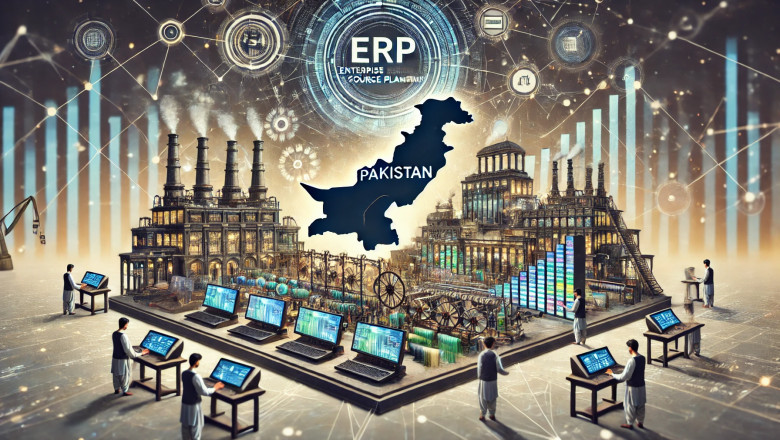views
The textile industry is a keystone of Pakistan's economy, contributing significantly to employment and export revenues. However, it faces several critical challenges that hinder its growth and global competitiveness. Of those challenges one of the main problems is outdated technology.
In Pakistan, a large segment of the textile industry still uses outdated machinery, resulting in inefficiency and lower quality products. The industry status quo restricts it from complying with international standards and responding to changing market requirements.
Picture a clothing or textile business in any of the main cities of Pakistan, and its managers and employees juggling between responsibilities trying to keep up with different tasks and departments. From outdated manual records, lost invoices, delayed orders to overall inefficient workflows, all this leads to constant delays and financial mismanagement in the business.
Let’s talk about why textile businesses need to replace these outdated systems with advanced ERP and how ERP in Pakistan has seen a boom over the years.
The Pre-ERP Era
Before ERP adoption, businesses in Pakistan struggled with:
-
Manual record-keeping – Stacks of paper-based ledgers made financial tracking slow and inefficient.
-
Data silos – Different departments worked independently, leading to miscommunication and lost productivity.
-
Slow decision-making – Without real-time data, managers relied on outdated reports.
-
Compliance issues – Many businesses faced challenges meeting FBR taxation policies, digital invoicing requirements, and audit processes.
-
Financial mismanagement – With no centralized system, cash flow tracking, payroll management, and profit analysis were often inaccurate.
Small and medium-sized enterprises (SMEs), in particular, found it difficult to scale due to these inefficiencies.
The ERP Boom in Pakistan
The demand for ERP solutions in Pakistan has surged due to several factors:
Growing Adoption Across Businesses
With the rapid speed of digital transformation in Pakistan, more SMEs are investing in the ERP solutions that streamline operations and keep the competitive edge. Cloud based ERP systems are now more affordable than ever, making it easy for all businesses to deploy complete management solutions.
Government Regulations Driving ERP Adoption
The Federal Board of Revenue (FBR) has introduced strict policies on taxation, digital invoicing, and reporting. Businesses now need ERP solutions to stay compliant and avoid penalties.
Globalization and Digital Transformation
With increased international trade and e-commerce, businesses need ERP systems that can handle multi-currency transactions, supply chain management, and customer data analytics.
Why Textile Businesses in Pakistan Need ERP
Why Do Textile Businesses Need ERP?
The textile business has many departments: making fabric, managing supplies, complying with rules, tracking money. Without the appropriate system in place, businesses can run into issues such as stock shortages, delays in production, a lack of quality control, and wasted resources. This is where (Enterprise Resource Planning) ERP software comes into play.
Better Inventory & Supply Management
Textile companies handle everything from raw materials to finished products. An ERP system tracks inventory in real time, making sure there’s always enough stock while reducing waste. It also helps businesses buy materials on time, keep an eye on usage, and predict future demand.
Smoother Production Planning
From spinning and weaving to dyeing and stitching, textile production has many steps. ERP software helps businesses plan production schedules, assign tasks, and use machines and workers efficiently, avoiding delays and downtime.
Managing Money & Cutting Costs
ERP integrates accounting, payroll, and cost tracking into a single system. This allows businesses to manage costs, maintain cash flow [and] determine competitive pricing.” Real-time expenditure insight allows businesses to make informed decisions that lead to higher profits.
Faster Order Handling & Happier Customers
ERP helps businesses track orders, monitor production progress, and manage deliveries efficiently. This reduces mistakes, speeds up processing times, and improves customer satisfaction. Integration with online platforms also makes it easier to handle large orders.
Growing with Digital Tools
As the textile industry grows, manual processes are hard to manage. They allow remote access in the cloud-based model, which helps in controlling various business units from a single platform. Artificial intelligence or smart ERP from cloud-based platforms makes decision making even better and faster by providing automated reports and smart predictions.
By adopting ERP software, textile businesses can work more efficiently, cut costs, and stay competitive in a fast-changing industry.
The Future of ERP in Pakistan
ERP technology in Pakistan is changing fast, bringing new possibilities for businesses. Here’s what’s on the horizon:
Blockchain for Security and Transparency
Improved security of ERP through blockchain technology due to its immutable nature will provide transparency in record-keeping, supply chains, and financial transactions. This could be especially advantageous for businesses that process sensitive information, like finance and healthcare.
Government Regulations Driving ERP Adoption
As Pakistan is encouraging digital taxation, financial transparency and compliance, a larger number of businesses are accelerating to deploy ERP solutions with regulatory reporting and tax compliance focus to operate best and mitigate risk of legal implications.
The Road Ahead
With continuous advancements in technology, ERP systems in Pakistan will continue evolving, becoming more affordable, intelligent, and industry-specific. Businesses that embrace these innovations will gain a competitive edge, making ERP adoption a necessity rather than an option.
Final Thoughts
ERP in Pakistan’s textile industry marks the future of working smarter, not harder, ensuring excellence, financially sound decisions, and optimized order management and production processes. However, in the face of accelerating digital transformation, adopting ERP is less of a luxury and more of a necessity. With the adoption of cutting-edge ERP solutions, textile companies can be competitive, meet global standards, and foster long-term growth in a dynamically changing landscape.














Comments
0 comment